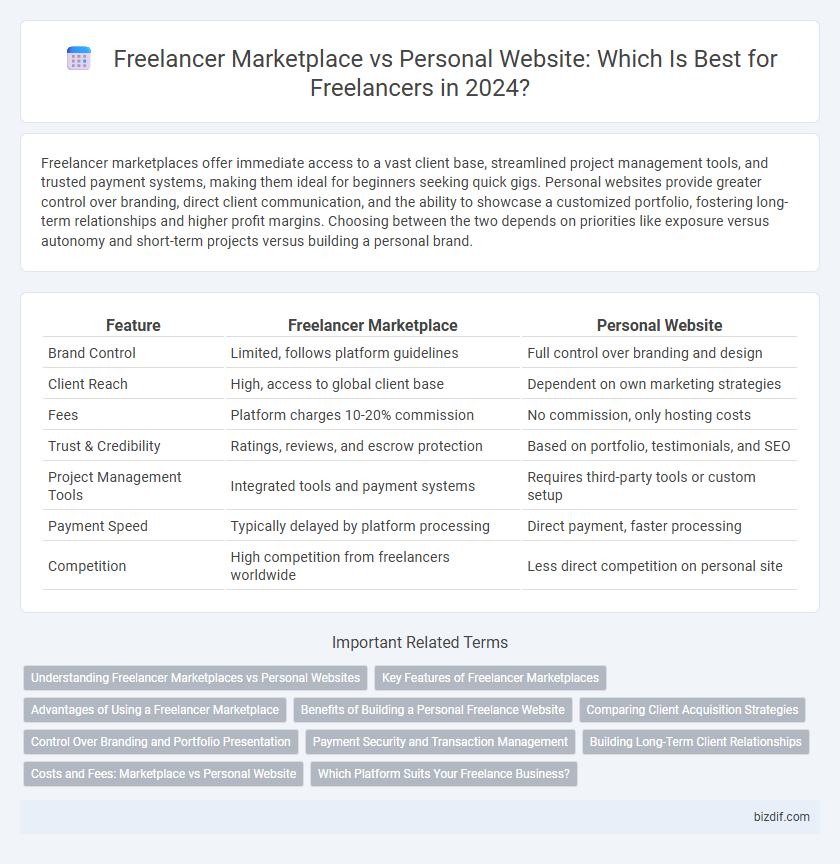Freelancer marketplaces offer immediate access to a vast client base, streamlined project management tools, and trusted payment systems, making them ideal for beginners seeking quick gigs. Personal websites provide greater control over branding, direct client communication, and the ability to showcase a customized portfolio, fostering long-term relationships and higher profit margins. Choosing between the two depends on priorities like exposure versus autonomy and short-term projects versus building a personal brand.
Table of Comparison
| Feature | Freelancer Marketplace | Personal Website |
|---|---|---|
| Brand Control | Limited, follows platform guidelines | Full control over branding and design |
| Client Reach | High, access to global client base | Dependent on own marketing strategies |
| Fees | Platform charges 10-20% commission | No commission, only hosting costs |
| Trust & Credibility | Ratings, reviews, and escrow protection | Based on portfolio, testimonials, and SEO |
| Project Management Tools | Integrated tools and payment systems | Requires third-party tools or custom setup |
| Payment Speed | Typically delayed by platform processing | Direct payment, faster processing |
| Competition | High competition from freelancers worldwide | Less direct competition on personal site |
Understanding Freelancer Marketplaces vs Personal Websites
Freelancer marketplaces like Upwork and Fiverr offer access to a vast pool of clients, streamlined project management tools, and built-in payment systems, providing freelancers with immediate visibility and trust through platform reputation. Personal websites allow greater control over branding, direct client relationships, and portfolio presentation, enhancing long-term client loyalty and custom marketing strategies. Balancing the broad reach of marketplaces with the personalized approach of personal websites optimizes freelance business growth and professional independence.
Key Features of Freelancer Marketplaces
Freelancer marketplaces provide a streamlined platform with built-in tools like project matching algorithms, secure payment systems, and dispute resolution services that enhance trust and efficiency for both clients and freelancers. These platforms often feature comprehensive profiles, ratings, and reviews that help freelancers build credibility and attract projects quickly. They also offer scalability and exposure to a global client base, which is challenging to achieve through a personal website alone.
Advantages of Using a Freelancer Marketplace
Freelancer marketplaces offer vast exposure to diverse clients globally, increasing the chances of securing projects quickly through built-in trust mechanisms like reviews and ratings. They provide streamlined payment processing and dispute resolution, ensuring financial security and reducing administrative burdens for freelancers. Access to a ready-made job pool with transparent competition reduces marketing efforts compared to maintaining a personal website.
Benefits of Building a Personal Freelance Website
Building a personal freelance website enhances brand credibility by showcasing a tailored portfolio, client testimonials, and unique services directly to potential clients. It offers full control over content, design, and user experience, reducing dependency on third-party platforms and their algorithms. Personal websites improve SEO visibility, driving organic traffic and generating consistent leads without the competition found on freelancer marketplaces.
Comparing Client Acquisition Strategies
Freelancer marketplaces offer immediate access to a broad client base through built-in search algorithms and reputation systems, enabling freelancers to secure projects quickly. Personal websites require proactive SEO strategies and content marketing to attract organic traffic, fostering long-term client relationships and brand authority. Combining marketplace presence with a well-optimized personal site maximizes client acquisition by leveraging both instant visibility and sustainable online positioning.
Control Over Branding and Portfolio Presentation
Freelancer marketplaces offer limited control over branding and portfolio presentation due to standardized templates and platform restrictions. Personal websites provide complete autonomy to customize visual design, showcase unique skills, and highlight selected projects tailored to specific target audiences. This control enhances personal brand identity and can impact client perception and trust significantly.
Payment Security and Transaction Management
Freelancer marketplaces provide robust payment security features including escrow services, dispute resolution, and standardized transaction management systems to protect both clients and freelancers from fraud. Personal websites require integrating secure payment gateways such as PayPal, Stripe, or direct bank transfers, placing full responsibility on freelancers to manage transaction security and client trust. While marketplaces offer streamlined financial processes and trust-building mechanisms, personal websites allow greater control over payment terms but demand vigilant management to ensure secure and timely payments.
Building Long-Term Client Relationships
Freelancer marketplaces offer immediate access to a broad client base but often foster transactional, short-term engagements due to high competition and standardized project scopes. Personal websites enable freelancers to showcase unique skills, brand identity, and past work, cultivating trust and personalized communication that enhance long-term client relationships. Investing in a professional website combined with targeted outreach increases client retention and repeat business more effectively than relying solely on marketplace platforms.
Costs and Fees: Marketplace vs Personal Website
Freelancer marketplaces often charge fees ranging from 10% to 20% per project, significantly impacting net earnings, while personal websites involve fixed costs such as domain registration and hosting fees, typically under $100 annually. Marketplaces provide built-in traffic and client access, reducing marketing expenses, but personal websites require investment in SEO and promotion to attract clients. Choosing between a marketplace and a personal website involves balancing ongoing commission fees against upfront and maintenance costs to optimize profitability.
Which Platform Suits Your Freelance Business?
Freelancer marketplaces like Upwork and Fiverr offer vast client pools with streamlined payment and dispute resolution, ideal for newcomers building a portfolio quickly. Personal websites provide complete brand control, allowing freelancers to showcase unique skills, testimonials, and premium services for long-term client relationships. Choosing between them depends on your business goals: marketplaces suit rapid growth and exposure, while personal websites enhance brand identity and higher-value engagements.
Freelancer Marketplace vs Personal Website Infographic

 bizdif.com
bizdif.com